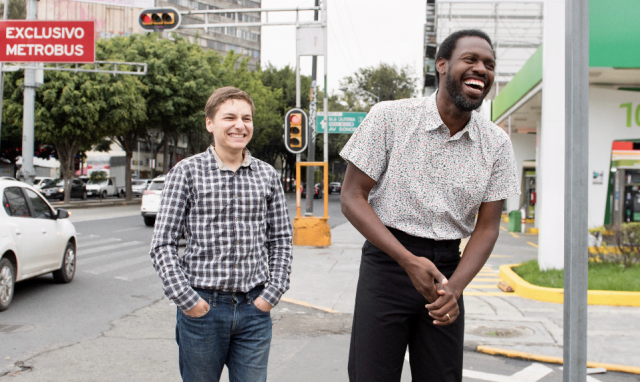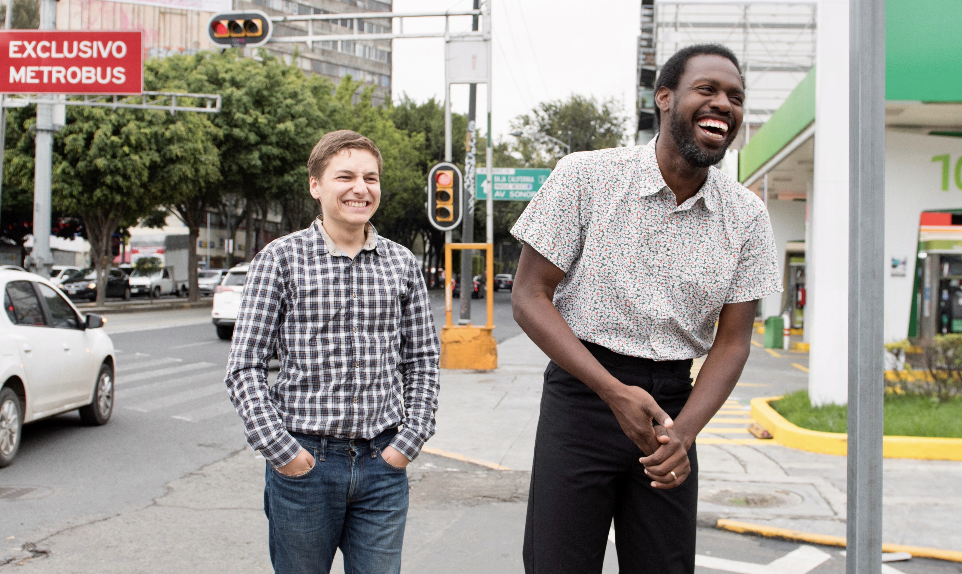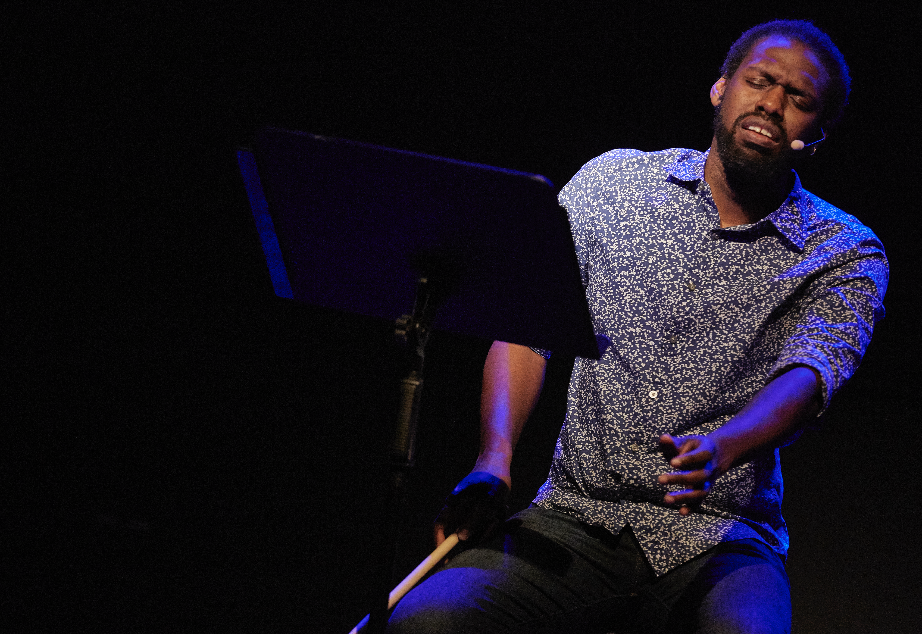
By Ryan Michaels
The Birmingham Times
When Anthony Russell, then 12 years old, found a bootleg copy of the Oscar-winning 1984 film “Amadeus” in his parents’ drawer of recorded VHS tapes, he didn’t expect his life to change.
“I watched this movie and became absolutely obsessed with it. I used to watch it, basically, multiple times a day,” Russell recalled.
The film, a fictionalized account of the life and work of composer Wolfgang Amadeus Mozart, led to Russell’s first love—opera—and now the 42-year-old, known as Anthony Mordechai Tzvi Russell, prepares to share that love with Birmingham.
Russell and accordionist Dmitri Gaskin, who make up the Yiddish music duo Tsvey Brider, will be featured April 22 at Temple Beth-El in Birmingham’s Southside community.
Tsvey Brider, which means “two brothers” in Yiddish, was formed in 2017, a few years after the pair met in the San Francisco, California, Bay Area Jewish music scene in 2013, when Gaskin was just 18. The number of people performing Jewish music in the Bay Area is very small, so it was only a matter of time before they performed together.
Russell said he found that Gaskin was a kindred spirit.
“The wonderful thing about working with [Gaskin] is that I really found somebody who was interested in collaborating on a very sort of committed level and really had a lot of ideas about what he wanted to do with Jewish music,” Russell said.
Gaskin cited the strong “emotional expression the two have during a performance.”
“If I hear [Russell] singing a certain thing right now, I’m trying to play something that goes with that. That’s my responsibility, but I can also try and play it in a way that influences him to do something that I think will sound good,” Gaskin said.
Trying to do something creative within the concept of Jewish music can be difficult because of the preconceived ideas people have about what it should be, Russell said.
“[People] know a lot about music you would hear at a Jewish wedding, and it doesn’t necessarily feel like something that could be a source of creativity and connection with different histories with different cultures,” he added. “I think what [Gaskin and I] are interested in is sort of exploring the possibilities of both Jewish music and music in the Yiddish language.”
Russell said his success is due to a few reasons—one of those being that he’s African American.
“If I can be completely honest, it is unusual, at least nowadays, to see a Black guy singing in Yiddish, and I am going to fully acknowledge that. … It’s also a genre of music that people either haven’t heard of, so it’s interesting to them, or… are very, very familiar with but haven’t seen anybody doing it in a really long time,” he said.
Russell has performed on stages globally including Tel Aviv, London, Berlin, Warsaw, Toronto, Los Angeles, Philadelphia, Boston, Miami and Krakow, Symphony Space in New York City and the Kennedy Center in Washington DC.
Finding Music
He has not always been steeped in Jewish culture.
Born in Fort Worth, Texas, Russell grew up mostly in the Bay Area with his military father, Anthony Russell Sr., and former concert pianist mother, Michelle Adams.
Russell, who is the oldest of four boys, began homeschooling in the sixth grade through high school because public school didn’t work for him. He had been considered for a gifted program while “simultaneously about to flunk out” of his grade.
“I was very interested in the things I was interested in, and I was very not interested in the things I was not interested in, and that’s generally not the way to receive a conventional public-school education,” he said. “What I was very interested in was reading, history, music, and culture. What I was not interested in was basically mathematics.”
“People just couldn’t figure out what to do with me,” he added.
There was a real appreciation for music in his household, where “a lot of music floated around,” Russell said.
While his mother always had a Claude Debussy (French composer of the late 19th and early 20th century) songbook near, Russell, a bass opera singer, first found classical music through “Amadeus.”
Russell, then age 12, learned everything he could about classical music and opera, aided by his “autodidact,” or self-teaching, tendencies.
“It’s the same thing with anybody who sort of discovered something at that age,” he said. “It’s like you become obsessed and then, all of a sudden, it almost becomes who you are.”
His first introduction to formal music knowledge came after he started taking piano lessons, which helped to push him closer to his real love.
“After doing that for a couple of years, it occurred to me that I was not going to be, in any way, a concert pianist, … but I did like to sing,” he said.
Leaving behind any serious aspirations for piano performance, Russell began taking singing lessons. In 2002, he started his freshman year at Holy Names University in Oakland, California, where he studied voice and earned a Bachelor of Arts degree in music in 2005.
Another Cinematic Intervention
Raised Christian, Russell was introduced to Judaism in 2007 through Rabbi Michael Rothbaum, the man he would marry in 2015, in New York City. Though the pair had corresponded previously, Russell happened to be in the city, and the couple went to a New York Mets baseball game for their first date.
They also went to a showing of Joel and Ethan Coen’s 2009 film, “A Serious Man,” an “intensely Jewish film,” according to Russell.
“It was funny,” he said. “When my husband and I went to go see it at this movie theater, the movie ended, and we were like, ‘Wow, that was amazing, but who is the audience for this film?’ We looked at each other, and we are the only people in the movie theater, except for this couple all the way in the back: an old Orthodox, [or conservative Jewish], man and his wife.”
During the movie, Russell said, a particular song struck him.
“A character puts on an album, and out of the record player comes this deep, dark, sort of beautiful bass voice singing in Yiddish, and I was like, ‘Huh?’” recalled Russell, who immediately assumed the singer was Paul Robeson, famed African American actor, activist, athlete, and singer, who was known for singing in a variety of languages, including Yiddish.
Two years later, in 2011, Russell converted to Judaism—the same year he traveled to Israel, where he studied Yiddish at Tel Aviv University—and moved back to the Bay Area in California. Judaism appealed to Russell because of its inquisitive nature and emphasis on responsibility.
“What I saw in Judaism was a particular culture of questioning and wrestling and engagement with not only the question of belief but also the responsibility of the person to be a good person and to do good things in the world. Just believing is not enough,” Russell said.
“When I was growing up, there weren’t a whole lot of people who actively identified as Christian and also identified as people who really understood what it was to be queer, lesbian, gay, bisexual, whatever. Now, you can find people who are able to sort of stand up in their identities as religious people and as queer people, and that’s an amazing thing,” Russell said.
The Yiddish art song duo Tsvey Brider—singer Anthony Mordechai Tzvi Russell and accordionist Dmitri Gaskin—will perform April 22 at Temple Beth-El, 2179 Highland Ave. S., Birmingham, AL 35205.



















